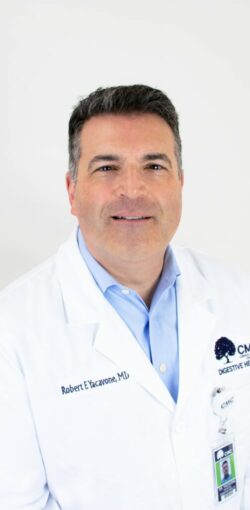Cologuard: No match for a colonoscopy
First published by myhorrynews.com and Waccamaw Publishers in the March 2023 Horry County Health & Wellness Section
You’ve heard the old saying “If it’s too good to be true, it probably is.” Cologuard, an at-home screening test for colorectal cancer, has an extensive TV, print, and digital marketing campaign touting the comfort and convenience of their product, but the Cologuard test is in no way a better alternative to a colonoscopy.
“There are many different ways to screen for colon cancer,” explains Dr. Robert Yacavone, a fellowship-trained gastroenterologist with CMC Digestive Health. “There are tests like Cologuard that can help detect colon cancer and then there is the colonoscopy that not only detects the cancer, it can help prevent it. There is a huge difference there.”
The truth about Cologuard tests
Cologuard does not prevent colon cancer like colonoscopies do. “Cologuard tests have several limitations that I think are important to highlight,” explains Dr. Yacavone. “I think patients should understand that when they decide what method of colon cancer screening is best for them that they understand this significant difference. Cologuard is for colon cancer detection whereas, colonoscopies not only detect colon cancer, they also prevent it.”
In fact, Cologuard tests only detect cancers AFTER you have developed them. A colonoscopy PREVENTS colon cancer because polyps that have the potential to become cancerous are removed immediately. That is potentially lifesaving.
Cologuard tests can be useful for those who are in areas where medical services are not readily available. “It can detect colon cancers at rates similar to colonoscopy. Cologuard tests detect 92% of colon cancers while a colonoscopy can detect 95% of colon cancers so those rates are comparable.” Dr. Yacavone is quick to note that any screening for colon cancer is better than no screening.
“The problem with Cologuard is that it’s not very good at identifying pre-cancerous polyps and when we talk about screening and prevention, we’re really talking about the ability to identify these polyps and remove them so that patients are less likely to develop colon cancer,” says Dr. Yacavone.
30% of polyps that will soon become cancer are missed by Cologuard tests. This is significantly less effective than a colonoscopy. A colonoscopy detects the same polyps 95% of the time and they are removed during the same procedure. By removing the polyps as part of the colonoscopy procedure, you are removing the potential for cancer itself.
What could cause a false positive with a Cologuard test?
Most inaccurate results occur because there is blood present in the stool, and hemorrhoids are one cause of blood in the stool. Diarrhea and menstruation are other possible causes. For this reason, the National Institutes of Health recommends that you avoid taking a test if you are menstruating or have diarrhea or hemorrhoids (or any other type of rectal bleeding).
Foods like red meat, beets, broccoli, cantaloupe, carrots, cauliflower, cucumbers, grapefruit, horseradish, mushrooms, radishes, and turnips can all trigger false alarms and could lead to unnecessary additional testing.
DO NOT disregard a positive Cologuard test if you were experiencing one of these conditions when you did your stool test. “Just because you have a hemorrhoid when you receive your test result doesn’t mean you can write it off as a false positive. You should still contact a doctor to schedule a colonoscopy because cancer or polyps could still be present and need to be addressed,” implores Dr. Yacavone.
What happens next if your Cologuard test is positive?
If your Cologuard test warns of possible colon cancer, a diagnostic colonoscopy is the next step. Dr. Yacavone highlights this and the other implications that come from a positive Cologuard test.
“Once the Cologuard comes up positive, you have to have a colonoscopy. The first thing to know is that this colonoscopy will not be considered a screening colonoscopy. It would be considered a diagnostic colonoscopy and that has Insurance implications for most patients with most insurance carriers in most states.”
Most insurance companies will only cover one colon cancer screening test. If a stool-based test is positive, the follow-up colonoscopy may be considered diagnostic and fall under your deductible, money you have to pay out of pocket. This is important to know because the false positive rate is about 13%.
“If you don’t have insurance, a Cologuard test costs as much as $650 for the test. Cologuard is currently recommended every three years for average-risk individuals whereas a colonoscopy is recommended every 10 years. Colonoscopy costs between $2000 and $2500. The costs are comparable if you’re doing Cologuard three times as often as a colonoscopy. However, in terms of the quality of the screening experience and the ability to prevent colon cancer, they really don’t compare. Colonoscopy remains the gold standard,” urges Dr. Yacavone.
No “butts” about it, CMC is here for you
Dr. Robert Yacavone was adamant that any colon cancer screening test is better than no colon cancer screening test. Colon cancer is preventable, treatable, and beatable if caught in the early stages. That changes drastically if found in later stages and is likely life-threatening.
A colonoscopy exam, every 10 years, remains the best single test for the screening, detection, and prevention of colon cancer. “We believe “seeing is believing,” but further, finding and removing colon polyps while small and treatable is far better than being content with diagnosing colon cancer once it has happened,” stresses Dr. Yacavone. “Removing polyps is far easier than chemotherapy and surgery.”
You have options for colon cancer screening, and our providers, including Dr. Robert Yacavone, at CMC Digestive Health can help you decide which is the best test for you and your family, based on your unique health history. We would love to be your gastroenterology practice. Please schedule an appointment by calling us at 843-347-6038.

Dr. Robert Yacavone
Fellowship trained in Gastroenterology / Advanced Endoscopy at Mayo Clinic
Dr. Yacavone is Board-certified in Gastroenterology through the American Board of Internal Medicine (ABIM). His particular interest and focus is in the endoscopic diagnosis and treatment of biliary tract diseases (bile duct stones, bile duct infection, bile duct cancer), and pancreas disease (pancreatic cancer, chronic pancreatitis). Dr. Yacavone performs colonoscopy for colon cancer screening and performs advanced colon polyp removal (endoscopic mucosal resection and endoscopic full-thickness resection) which allows some patients with large precancerous polyps to avoid the need for surgery.
To set an appointment with Dr. Yacavone at CMC Digestive Health, call 843-347-6038 to request an appointment today!




